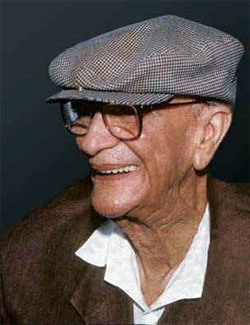|
Love such Law
Lazarus
(Spirit), in a
message posted
by Kardec, says
the Law of Love
replaces the
character by the
merger of human
beings and
destroys the
social miseries,
because love is
the effective
agent able to
overcome
obstacles
 |
Love is the Law
of Life. In him
we move, it
sustains us, we
serve him.
Created for the
love of a father
who intended us
to happiness -
to be built on
the merit of
their own
efforts - and
always supported
by the love of
brothers who
have experienced
and climbed the
steps of wisdom
and interior
lighting, are
situated in all
as apprentices.
Fortunately,
however, always
guided by
luminous beings
who, having
reached
maturity, tey
turn to guide us
in the difficult
and slow walk.
Mother Teresa of
Calcutta said
that the pencil
of God, saying
that whoever
wrote it was the
Lord. Chico
Xavier said he
was a speck.
Sister Dulce
said that
poverty is lack
of
|
|
love between
men.
In the same
vein, Jesus -
the benchmark
that we have in
terms of love,
purity and
greatness - also
said he did not
come to destroy
the law, but
comply with it.
As stated
Kardec, that
give you with
means to develop
it, give it its
true meaning and
appropriate it
to the degree of
progress of men
(1).
No need to set
an example, for
life and moral
acts and
teachings of
Jesus are very
clear.
However, what is
unclear is what
shapes the
greatness of
Mother Teresa,
Chico Xavier or
Sister Dulce
follow the same
path. (2)
Spirits are
mature, aware,
|
 |
 |
experienced and
essentially
exemplified the
Law of Love,
which is none
other than the
charity. The
same charity -
which,
incidentally, is
far beyond
charity and more
on relationships
- that inspired
Vincent de Paul,
Francis of
Assisi and other
expressive or
anonymous names
who lived and
live their lives
in order to
ease, benefit,
support and meet
the needs of
their brothers
walk. |
The detachment
of these
figures,
obedience to
which they
submit, humility
- while firmly -
and resignation
that demonstrate
and live, speak
a thousand words
of meaning and
inner
consciousness
has acquired the
goal of
experiencing
love. After all,
when asked about
the greatest
commandment in
the law, the
response of the
Master of
Mankind was
clear: "
And one of them,
a lawyer, asked
him a question,
trying him:
Teacher, which
is the great
commandment in
the law? And he
said unto him,
Thou shalt love
the Lord thy God
with all thy
heart, and with
all thy soul,
and with all thy
mind. This is
the great and
first
commandment." as
noted Matthew.
Jesus is the
inspiration for
that dignify the
human condition
On the other
hand, the
synthesis of the
Law of Love,
expressed in "All
things therefore
whatsoever ye
would that men
should do unto
you, even so do
ye also unto
them: for this
is the law and
the prophets",
the note of
Matthew, and
"And as ye would
that men should
do to you, do ye
also to them
likewise", the
record of Luke,
also follow the
same lines of
love, attention
and care for our
neighbor, not to
mention that the
same procedure
should apply to
ourselves, which
is not vanity,
but expression
also love, as we
in the same way
we respect and
Love.
Such
considerations
lead us back to
the examples
cited at the
beginning of
this chapter.
That reasoning
led Sister
Teresa Dulce and
to act as they
did? What is
this force that
moved in favor
of the poor and
destitute,
forgotten, sick
and abandoned?
Similarly, Chico
Xavier - in
Brazil of the
inspiring
initiatives for
the poor -
earned national
respect.
These examples,
among many
others that can
be cited -
including
anonymous -
follow the same
goal, needs,
find the one
that suffers
them to ease the
difficulties, to
extend the
compassionate
look of
compassion,
offer a helping
hand, the
stimulus word
and affection
and,
essentially, to
love, as
recommended by
the Divine Law
and taught by
the Master of
Mankind. Indeed,
that is, Jesus
is the Supreme
Inspirational
these noble
figures that
dignify the
human
condition.
The large queues
of people
seeking soup in
different
institutions -
from various
religious
denominations in
Brazil - which
accumulate to
receive a basket
of Christmas,
seeking the
bazaars and
donated clothes,
who need medical
care and free
dental, which
benefit from
vocational
courses also
charged, or
cutting of hair,
among other
volunteer
activities, a
number of
initiatives have
been telling us
that strength in
solidarity,
inspired by
love, that moves
so many people
everywhere. Here
we speak of
Brazil, but
there is another
force that moves
the
International
Red Cross, among
many other NGOs
around the
world.
Solidarity,
inspired by
love, moves...
Love is indeed
responsible for
the Holy Houses
of Mercy, Houses
St Vincent de
Paul, asylum,
orphanages,
kindergartens,
APAEs, among
many
initiatives, in
its origins,
which are
subject to the
bureaucracy,
demands and
needs of our
time. It is
love, this
effective agent
able to overcome
obstacles and
inspire such
actions. It is
that solidarity,
inspired by
love, moves.
Therefore, the
Spirit Lazarus
(3) emphasizes:
“(...)The law of
love substitutes
the selfishness
of man with the
harmonizing of
all beings in
brotherly love,
thereby
extinguishing
social miseries.
(...)”.Such a
crush of social
misery (I invite
you to expand
the meaning of
the term social
misery, which,
obviously, not
just hunger or
misery material)
is exactly the
initiative, or
initiatives to
ease the
difficulties of
others. And the
figures cited in
this chapter are
masters at
teaching us how
to do it,
illustrating,
especially
through the
detachment and
compassion, that
meet the
difficulties of
others.
In the chapter
XI of The
Gospel According
Spiritism,
item 9, Fénelon
also states:
“(...)Well then,
so that you may
practise the law
of love as God
intended, it is
necessary that
you learn
step-by-step to
love all your
fellow beings
without
distinction
(...)because God
so desires. The
law of love is
the first and
most important
precept of the
new doctrine,
because one day
it will destroy
all selfishness
under whatever
form it may
present itself
(...)”.
In developing
this approach we
need a huge
effort to resist
the urge to do
other
transcripts,
such is the
monumental
beauty of
Chapter XI of
that book titled
Kardec Love
Your Neighbour
As Yourself.
The
considerations
of the encoder
and the selected
messages and
instructions
included in the
subtitle of the
spirits of the
chapter are a
valuable
document to
understand this
remarkable and
Law of Love.
Interesting
because in the
same chapter is
also on
approaches to
charity for the
criminals that
are magnified in
the next
chapter, the
number XII,
titled Love
Your Enemies,
also with
valuable
thoughts and
messages about
revenge, hatred
and also the
disembodied
enemies.
It is that love
does not end!
So it is no
accident that
the chapter
XIII, as a
result,
addresses the
hidden woes, the
widow's mite,
Charity moral
and material
charity, The
Charity and
Pity, among
other subtitles.
Note that all
goes towards
charity, all to
teach us that we
must respect,
understand and
help others,
despite their
mistakes and
difficulties,
not least
because we also
need all of
this.
Without Charity
There Is No
Salvation
Kardec used this
title for the
third chapter XV
of the work of
the Codification
of Spiritism, as
mentioned in
this chapter.
Opening the
chapter with the
familiar parable
of the Good
Samaritan, the
encoder states
in its initial
considerations
in item 3, which
“All the moral
teaching of
Christ resumes
itself in the
need for charity
and humility,
that is to say,
in the two
virtues which
are contrary to
selfishness and
pride. (...)”.
Similarly we
used the 1st
Epistle to the
Corinthians,
chap. XIII, v. 1
to 7 and 13,
Paul, just
addressing the
charity, which,
according to the
Apostle,
“(...)Love
suffereth long,
[and] is kind;
love envieth
not; love
vaunteth not
itself, is not
puffed up, doth
not behave
itself unseemly,
seeketh not its
own, is not
provoked, taketh
not account of
evil; rejoiceth
not in
unrighteousness,
but rejoiceth
with the truth;
beareth all
things,
believeth all
things, hopeth
all things,
endureth all
things. (...)”.
Allan Kardec
makes us then
think seriously
about the great
virtue of
charity, timely
considerations
that the reader
finds in item 8
of that chapter
XV and rewards
the student with
the message
dictated by Paul
himself in 1860,
just under the
title Out
Charity is no
salvation,
authentic flag
of
Spiritualism.
In that message,
which closes the
chapter, we
constantly read,
reread,
disseminate and
study, read the
following:
“(...)Nothing
can indicate
with more
exactitude nor
summarize so
well mankind's
obligations, as
this divine
maxim. Spiritism
could not better
prove its origin
than present it
as its rule,
because it is a
reflection of
the most pure
Christianity.
Humanity will
never go astray
if it takes this
as its guide. So
then, my dear
friends,
dedicate
yourselves to
the
understanding of
the deep meaning
behind these
words and the
consequences of
their
application and
then discover
for yourselves
all the many
ways in which
they may be
applied. Submit
all your
activities to be
administered by
charity and your
conscience will
respond. Not
only will it
cause you to
avoid practising
evil, but it
will also make
you practise
goodness, in as
much as a
negative virtue
is not enough;
it is necessary
to possess an
active virtue.
Therefore in
order to do good
there is always
the need for the
action of
willpower,
whereas in order
to not practise
evil it is
sufficient to be
inert or
unconcerned.
(...)”.
The incomparable
Sermon on the
Mount
I could not
finish the
chapter without
referring me to
their
incomparable
Sermon on the
Mount. Such is
their expression
of guidance and
comfort, it can
not be
forgotten.
Rather, they
should be
studied and
needs to be with
us in the
internal and
external
struggles of our
evolutionary
path. For that
directly linked
to charity,
including
ourselves, must
be remembered
here for
emphasis,
however
briefly.
Many works were
written and
inspired by your
valuable
content, author
embodied and
disembodied. We
hope, however,
suggest to
readers the
knowledge of
some specific
works, very
valuable in
itself in the
understanding of
comfort
expressed in
memorable Sermon
on the Mount:
• The Secret of
the Beatitudes,
José Lázaro
Boberg, Editora
EME. A
remarkable work
of almost 400
pages, divided
into seven parts
and provides
substantial
study to the
reader. Do not
miss;
• The Voice of
the Hill,
Richard
Simonetti,
Editor FEB. The
popular and
lucid author,
with his usual
didactic, offers
valuable study,
highlighting
excerpts from
the original
text;
• Jerônimo
Mendonça and
Chico Xavier:
The formula for
happiness,
Editora Mythos.
Authored by
Jamiro dos
Santos Filho,
the book
compares the
Sermon on the
Mount as the
only Formula of
Happiness,
revealed by the
Chico Jerome;
• Several books
devoted author
Therezinha
Oliveira,
Campinas. The
fruitful author
has published
several books on
studies of the
Gospel. We
search by author
name, because it
is very studious
and dedicated
with great works
published by
Editora CEAK.
Notas:
(1)
The Gospel
According to
Spiritism,
chapter I, item
3.
(2)
Examples of
Mother Teresa,
Chico Xavier and
Sister Dulce
provide material
for extensive
studies and
discussions on
this
extraordinary
virtue, which is
charity, the
result no doubt
of the Law of
Love,
established by
the Creator and
presented to
mankind by Jesus
of Nazareth the
model and guide
us all.
(3)
The Gospel
According to
Spiritism,
chapter XI, item
8.
|